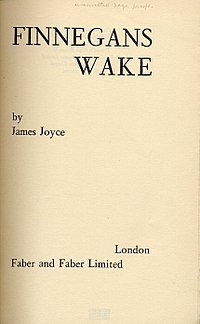
Back يقظة فينيغان Arabic Бдение над Финеган Bulgarian Finnegans Wake Catalan Finnegans Wake Czech Finnegans Wake Danish Finnegans Wake German Η αγρύπνια των Φίννεγκαν Greek Finnegans Wake Esperanto Finnegans Wake Spanish Finnegans Wake Basque
 | |
| Author | James Joyce |
|---|---|
| Language | English |
| Publisher | Faber and Faber |
Publication date | 4 May 1939 |
| OCLC | 42692059 |
| 823/.912 21 | |
| LC Class | PR6019.O9 F5 1999 |
| Preceded by | Ulysses (1922) |
Finnegans Wake is a novel by the Irish writer James Joyce. It is known for its allusive and experimental style and its reputation as one of the most difficult works in literature. In 1924, it began to appear in installments under the title "fragments from Work in Progress". The final title was only revealed when the book was published on 4 May 1939.
The initial reception of Finnegans Wake was largely negative, ranging from bafflement at its radical reworking of language to open hostility towards its seeming pointlessness and lack of respect for literary conventions. Joyce, however, asserted that every syllable was justified.
Although the base language of the novel is English, it is an English that Joyce modified by combining and altering words from many languages into his own distinctive idiom. Some commentators believe this technique was Joyce's attempt to reproduce the way that memories, people, and places are mixed together and transformed in a dreaming or half-awakened state.
Despite the obstacles, readers and commentators have reached a broad consensus about the book's central cast of characters and, to a lesser degree, its plot. The book explores the lives of the Earwicker family, comprising the father HCE; the mother ALP; and, their three children Shem the Penman, Shaun the Postman, and Issy. Following an unspecified rumour about HCE, the book follows his wife's attempts to exonerate him with a letter, his sons' struggle to replace him, and a final monologue by ALP at the break of dawn. Emphasizing its cyclical structure, the novel ends with an unfinished line that completes the fragment with which it began.